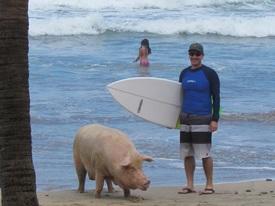Running
Replies
-
I have to laugh at being told you should switch to walking at the advanced age of 28. :laugh:
I started this past year at 38. I run with my 25 year old niece and my 54 year old brother. At the races we've been to, the bulk of the runners are in their 40s through 60s. My brother's age bracket is the most competitive... where there might be 7 or 8 runners in my bracket, there'll be 25 in his.0 -
. BUT the fact remains, there is NO shame in walking

Ask Jeff Galloway
http://www.coolrunning.com.au/general/1999e001.shtml
Links http://www.jeffgalloway.com/training/condition.html0 -
If I had a nickel for every out of shape person who told me how bad running is for me, I'd be a rich man!0
-
I've been running for 20 years, in that time I estimate that I have ran around 20,000 miles!!!
I currently run 160-170 miles per month and have ZERO problems with joints etc.
................and no, I'm not jogging ............I'm running ...............erm, and I'm 60 in August!!! :flowerforyou:0 -
I think many people don't take enough time to:
1. Stretch
2. Get the proper equipment -- shoes, etc.
3. Research proper running form and correct poor techniques like heel-striking
I recently researched proper running techniques and it opened my eyes how to run while reducing the stresses on my body and preventing injury. I see so many people running with styles that have so much impact on their bodies and it's very avoidable.0 -
If you're worried about your joints, do some exercises to strengthen the muscles that support your joints before you start any running. Do that every day for about 2-3 weeks, then gradually start walking and running.
Also, running outside is actually great for your joints because the turning, uneven terrain, hills, etc., all strengthen the muscles around your joints and increase your stability.0 -
that's a bunch of bologna -- I've been running for years, and have zero joint pain -- most running injuries are completely preventable with proper shoes, training and proper form. If you hear someone griping about their running injuries -- I can nearly guarantee they were doing or wearing something wrong.
*sticks hand up*
AGREE. - biggest thing ever is stretching! people don't stretch properly and it gives insane muscle pain when you don't stretch properly.
(if anyone has been paying attention to me or my posts lately - let it be said that although I'm a runner, I didn't get a runner injury. A car did that for me!)0 -
I just started running about 2 weeks ago. Im doing the C25k. I have had 3 knee surgery. Im going to keep on running as long as it don't hurt. I really hope it don't cause i injoy it.0
This discussion has been closed.
Categories
- All Categories
- 1.4M Health, Wellness and Goals
- 398.2K Introduce Yourself
- 44.7K Getting Started
- 261K Health and Weight Loss
- 176.4K Food and Nutrition
- 47.7K Recipes
- 233K Fitness and Exercise
- 462 Sleep, Mindfulness and Overall Wellness
- 6.5K Goal: Maintaining Weight
- 8.7K Goal: Gaining Weight and Body Building
- 153.5K Motivation and Support
- 8.4K Challenges
- 1.4K Debate Club
- 96.5K Chit-Chat
- 2.6K Fun and Games
- 4.8K MyFitnessPal Information
- 12 News and Announcements
- 21 MyFitnessPal Academy
- 1.5K Feature Suggestions and Ideas
- 3.2K MyFitnessPal Tech Support Questions






